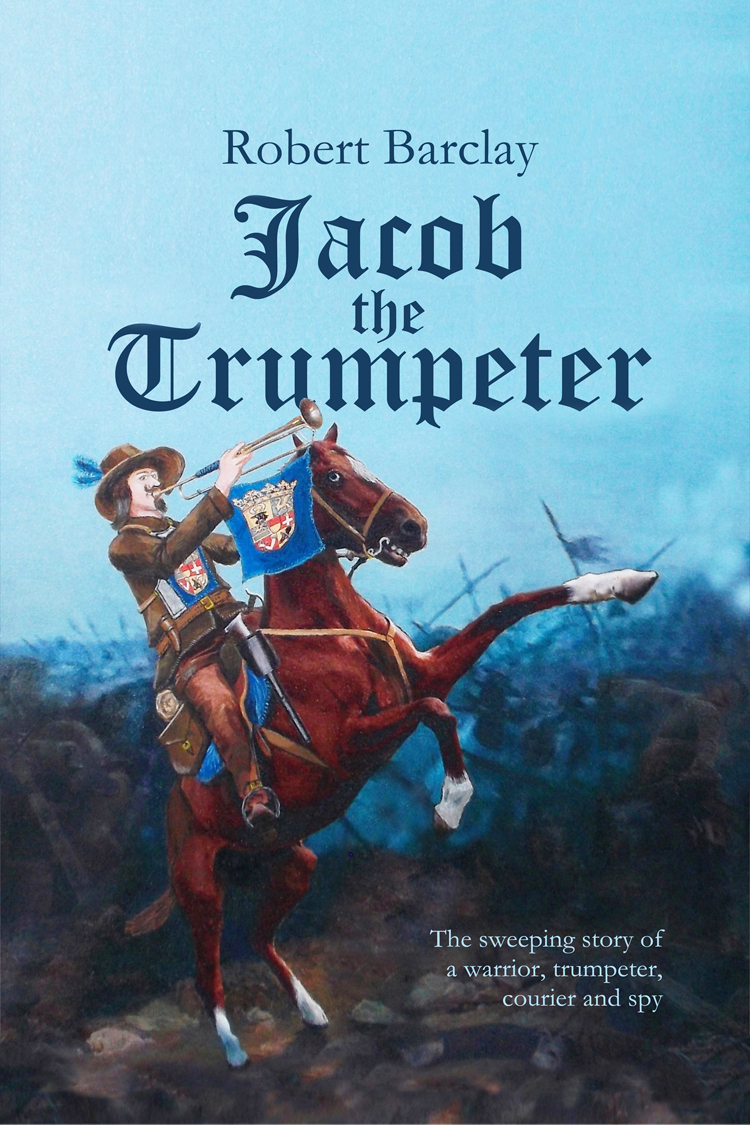 Robert Barclay. Jacob the Trumpeter. Ottawa: Loose Cannon Press, 2018. 424 pages. ISBN 978-1-988657-13-4. Click here for publisher's website and purchasing information.
Robert Barclay. Jacob the Trumpeter. Ottawa: Loose Cannon Press, 2018. 424 pages. ISBN 978-1-988657-13-4. Click here for publisher's website and purchasing information.
My experience is that most of the world often views the interests of HBS folks as weirdly focused or even strange. It is not often that a novel is published that would be deemed as perfect literature for our membership. But Bob Barclay’s latest work of fiction—he’s written three others—will be, without a doubt, of great interest to our community.
The book is one of historical fiction, mostly fiction, and centers on the possible biography of a real-life seventeenth-century trumpeter, Jacob Hintze. A chance find by Barclay’s colleague Michael Münkwitz is the real start of the story. In a church in the small village of Belitz, Germany, Münkwitz discovered a natural trumpet hanging on a wall alongside a votive plaque, dated 1676 and commissioned by Hintze’s widow. The plaque contains all the information we have about Jacob Hintze, namely that he was a trumpeter and innkeeper, the name of his wife, and that he was killed in a duel by one Joachim Wadegahte. Hintze’s sword was hanging beside the trumpet, but that has long disappeared. The trumpet also gives us some information: on the garland on the bell is an inscription, “Macht Wolff Birckholtz In Nürnberg 1650.”
From these bare bones Barclay conjures a possible life story of a seventeenth-century German trumpeter. It is a wonderful tale of fiction. Barclay is the perfect person to imagine Hintze’s life: he is well known to HBS members as a wonderful trumpet maker and the author of the definitive study of Nürnberg trumpet makers and instrument making techniques. The historical events in the novel are accurate and extremely detailed. It’s not often that a novel has detailed footnotes: my e-book Kindle edition makes reading the notes wonderfully easy with a simple click on the footnote number.
The story begins at the end, with Jacob’s eldest son prodding his father to write his memoirs. There is also a hint of Jacob’s poor health and a need to get the project started; and the tale of Jacob the trumpeter begins. His trumpet life begins when he hollows out an old bone on which he manages to play some rudimentary tones. Soon he has a chance encounter with a local Stadtpfeifer who sees promise in the young boy and gives him his 1617 Conrad Droschel Nürnberg trumpet. In spite of the legal restriction that only official members of the Kameradschaft are allowed to play the trumpet, Jacob plays in secret and develops his ability quickly through his self-taught method and deep love of the trumpet.
His luck lasts only a short while before he is spotted by Hoftrompeter Breitkopf, the head of the trumpet ensemble of Duke Adolf Friedrich of Mecklenburg-Schwerin. Seeing a diamond in the rough, Breitkopf arranges for the boy to become his apprentice, and life as a trumpeter begins for Jacob. Through his intimate knowledge of trumpet history, Barclay draws the image of this apprenticeship with numerous references to trumpet technique, repertoire, and methods including Bendinelli, Fantini, and Magnus Thomsen. Barclay cleverly weaves composers of the day into the story line. Since young Jacob begins his apprenticeship at the age of fourteen, it also is a coming-of age-tale. He leaves his training period a talented Stabstrompeter and begins his life as soldier in the employ of the Duke.
Music during this phase of his life music takes second place to his activities as a soldier, diplomat, and spy, as was customary for trumpeters in the seventeenth century. Barclay is a skilled storyteller, and the backdrop of battles and regional conflicts is also historically accurate. The intrigue he draws through Jacob’s espionage assignments is a real strength of this novel. Death-defying tasks and narrow escapes make up the bulk of Hintze’s life. While music is clearly the trumpeter’s main love, this seventeenth-century James Bond has little time to engage in it. Perhaps this is an accurate view of a trumpeter’s life at that time. His loyalty to the Duke is ultimately rewarded at the end of Jacob’s life. Not wanting to ruin the ending, I’ll stop here. Just to say that this enjoyable and historically informed novel paints a picture of a seventeenth-century trumpeter in a way that no number of scholarly brass history books can. Inspired by the possible life of Jacob Hintze, it a work of fiction and hence, not true. But it is so realistic in its possibilities that, as Barclay says in his Introduction, “It ought to be.”
Jeffrey Nussbaum



